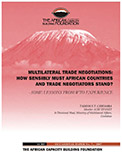
It is generally acknowledged that Africa’s participation in Multilateral Trade Negotiations (MTNs) improved both quantitatively and qualitatively since the launch of the Uruguay Round (UR). This is not to say that African negotiators have reached the same levels of preparedness and sophistication as their counterparts in the developed countries. A number of challenges still remain and some of them relate to capacity constraints in understanding the negotiations subjects / agenda due to lack of relevant training, lack of adequate economic and trade data and poor knowledge of the negotiations structure, all of which impact negatively on overall negotiation strategy. It is important to note that prior to the Uruguay Round, MTNs were seen as a preserve of the developed countries, whilst developing countries were marginal to the negotiations process and were largely recipients of preferential market access and other special differential treatment. No wonder GATT was regarded as a “rich men’s club”.





